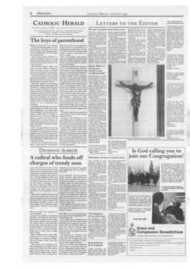Page 1, 16th July 1993
Page 1

Report an error
Noticed an error on this page?If you've noticed an error in this article please click here to report it.
Tags
Share
Related articles
Sir – Two Of The Claims Advanced By Fr Alexander
Inside
The Pope Opens Rome College
An Island Poet's Craft
Lesson For Gordon Brown From The French Revolution
Aid charities back Pope on birth control
BY DAVID BROWNE AND LUCY LETHBRIDGE GOVERNMENT ATTEMPTS TO
step up pressure on the Vatican to relax the Church's artificial contraception ban in developing countries drew criticism from Catholic aid agencies this week.
The Overseas Development Minister, Baroness Chalker of Wallesev told Parliament last week that she planned to meet with Vatican officials to express her concern about population growth in the Third World.
Lady Chalker said the huge growth in population was something to be addressed by the Catholic Church: "The differences are about how one can persuade married parents to have children by choice and not by chance," she said during Questions in the House of Lords.
Julian Filochowski, Director of CAFOD, told the Catholic Herald, that "any real dialogue on the issue of population and development can only be welcomed. But most Third World countries, togethe: with the Vatican, are highly suspicious of the donor country's motives.
"There is extraordinary concern to push population control measures on the Third World whilst ignoring the choking debt and injustices in trade which block any development."
A Vatican spokesperson told the Catholic Herald that although Baroness Chalker's formal request for an audience with Pope John Paul II had been received, her meeting with the Pontiff had not vet been "booked", and that this could not take place until the autumn, as the Pope will go to his summer residence of Castel Gandolfo tomorrow.
The spokesperson said that although Baroness Chalker "may bring up the issue of contraception in the Third World during her meeting with the Holy Father, she could not hope to affect Church policy on this issue".
The spokesperson denied that any "softening" of the Church's line on contraception had taken place, despite last week's article in the Jesuit periodical, Civilta Cattolica, which advocated that nuns in danger of being raped take the pill.
"That article was not an indication of a shift in the Church's position, but rather the personal opinion of a Jesuit priest," the spokesperson emphasised.
Ian linden of the Catholic Institute for International Relations (CIIR) said this week: "I think Lady Chalker over-estimates the importance of the Church as a faction in population control.
"The education of women, the presence or absence of care for the elderly and the life expectancy of children are all important in influencing population growth. The ODA's work in educating women may be much more important than talking to the Holy Father."
Lady Chalker met Vatican representatives at the United Nations Conference on the Environment and Development in Rio de Janeiro last year and explained proposals to use British aid to tackle population growth in Third World countries.
Lady Chalker said she wanted to see that conference make real progress in resolving some of the constraints to providing wider access to good quality family planing services.
Britain's policy on the population issue in the developing world is outlined in Children by Choice not Chance published by the Overseas Development Administration, which Lady Chalker heads.
The document states that British aid for population activities in developing countries should enable women and men to decide the number of children they have, and to have children by choice not chance.
British aid will be directed towards helping to establish good quality reproductive health services and help countries formulate their own population policies.
The policy document, Children by Choice not Chance, estimated that 100 million people would like to use contraception but do not have access to it.
Lady Chalker told parliamentarians last week that other faiths were taking steps to tackle population growth rates.
"I believe that there is an understanding that the huge growth in population is something to be addressed by the Catholic Church just as it must be addressed by every other religious leader," Lady Chalker said. "I hope that will happen. It is necessary for world peace."
But Julian Filochowski concluded that "When the volume of aid is so meagre, it would be totally unacceptable to switch scarce finances from food production to birth control."
blog comments powered by Disqus











